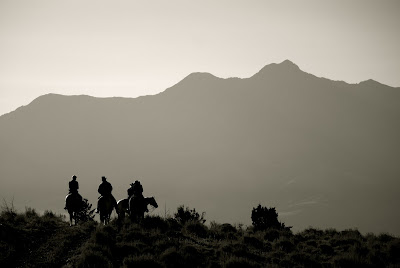Mountain Sky Guest Ranch
has a long history of providing a quality guest experience that is
authenticated in a rebooking rate that consistently tops 85 percent. That didn’t
happen by accident, rather it happened by design.
In Montana, the Arthur
Blank Family of Businesses (AMB) are committed to the Experience, Stewardship, and Community.
These three tenets are embedded in the fabric of Mountain Sky Guest Ranch, West
Creek Ranch, and the Basecamp and Challenge Course:
Experience: provide authentic experiences and lifelong memories
for our guests.
Stewardship: work to develop and implement sustainable business
practices that maintain the quality of our landscape.
Community: be socially and economically responsible to the
local community and broader society.
Further our actions seek
to epitomize AMB's core values -- in particular,
leading by example, innovating continuously, and giving back to others.
In Montana, our brand,
guest experience, and economic sustainability are inexorably linked to our environment.
The ranches are a vital piece of the larger Paradise Valley-Greater Yellowstone
Ecoregion that makes up one of the most unique landscapes in the world. As this
ecosystem is central to the guest experience, the AMB business model is bound
to the future of open space, wildlife habitat, water quality, and human
community.
The Paradise Valley,
viewed from 50,000-feet presents itself as four principal components (photo below): the
dark green of the forestlands, the browns and light greens of range and
agricultural lands, the blue ribbons of the Yellowstone River and its
tributaries, and the circles, squares, and lines of human communities. Collectively,
these are the components that make up the landscape, and they define AMB's work in the region.
Ranching, Open Space,
and Wildlife. Montana is known as
“Big Sky Country.” It is a description of both the size and the quality of the
land, its topography, its flora and fauna, and its human use. For the Paradise
Valley, the future of open space, and the wildlife that depends on it, hinges
on the preservation of working lands (i.e., ranching, timberland, and
recreational industry). Fragmentation of this landscape is the
number one concern in the Paradise Valley. While fences, agricultural practices, and the like have their impacts,
the primary cause for fragmentation is the loss of traditional ranching. The preservation of ranching as a prime
economic activity, therefore, becomes the single best way to preserve the
region’s wildlife, open space, and ecosystem services. To us it means:
·
Experience:
Guests get a first-hand look at the landscape with wranglers as their guides
·
Stewardship: Sustainable grazing practices backed up by annual monitoring
·
Community: Grants
to Western Sustainability Exchange in support of sustainable ranching
Upper Yellowstone Watershed. The Yellowstone is a complex river, at once iconic
while neglected, beloved while ignored, famed for its blue-ribbon fisheries
while essential for irrigation water. The river is vital to the local economy
yet poorly monitored; it shows signs of ecological stress, yet lacks a
champion represented by a broad coalition of interests. To us it means:
·
Experience:
Guests fish Big Creek and the Yellowstone
·
Stewardship: Commitment
of in-stream flow in Big Creek for fisheries, and regular water quality testing
·
Community: Grants
and volunteer time to Upper Yellowstone Watershed Group
Forestlands. The Paradise Valley is encircled by public lands
providing a wealth of ecosystem services (e.g., clean water), recreational
opportunity, and other contributions. The largest land manger in the region, is
the U.S. Forest Service. It is not an exaggeration to state that where goes the
national forest, so goes Mountain Sky Guest Ranch and West Creek Ranch.
Being a neighbor to the
national forest brings the benefits of grazing leases and multitude of recreational
trails. These benefits, however, are counterbalanced by the menace of wildfire,
noxious weeds, and trespass. At present, the future of the 155,000-acre Hyalite
Porcupine Buffalo Horn Wilderness Study Area, lying adjacent to Mountain Sky Guest Ranch and West Creek Ranch, is
uncertain; the Forest Plan is undergoing its first update in 30 years; Forest Service budgets are at all-time lows; and need for constructive
community engagement in forest planning and ongoing management is critical. To
us it means:
·
Experience:
Enjoying an adult beverage watching the light play across the forest
·
Stewardship: Managing
juniper encroachment to maintain grasslands and sage-shrub
·
Community: Supporting Future
Farmers of America's annual holiday collection of trees and wreath-making
materials on the ranches
Community. Author Wallace Stegner observed that when the western
United States “fully learns that cooperation, not rugged individualism, is the
quality that most characterizes and preserves it… then it has a chance to
create a society to match its scenery.”
The earliest European settlers, awed by
the natural beauty and fertile soils along the Yellowstone River, called the
place “Paradise Valley,” and it remains so to this day. The economy of Paradise
Valley is growing and expanding. It possesses an enviable combination of
high-quality amenities (e.g., education, recreation, airport access) combined
with abundant scenery. The presence of public lands and deep agricultural roots
gives the region a natural competitive advantage for continued economic growth.
The upsides of this growth include new job creation and a richer overall social
and intellectual fabric. These come with the challenge of
managing growth, including sustaining the way of life that residents enjoy and
the need to provide quality human services. Growth also unsettles. With a
growing population of people “from away,” the community’s cohesiveness is threatened
and the status quo is no longer “the way things used to be.” To us it means:
• Experience: Guests enjoying the annual Livingston Fourth of
July Rodeo
• Stewardship: Basecamp and Challenge Course offered to
regional nonprofits
• Community: Staff volunteering in the Livingston Food Pantry
As we do our work, we are
guided by four basic principles: 1) focus on maintaining open space and working
lands; 2) recognize that sustainable means land health, profitability, and social
capital; 3) cooperate and collaborate; and 4) identify
the common ground that unites, not the fringe that divides.






No comments:
Post a Comment